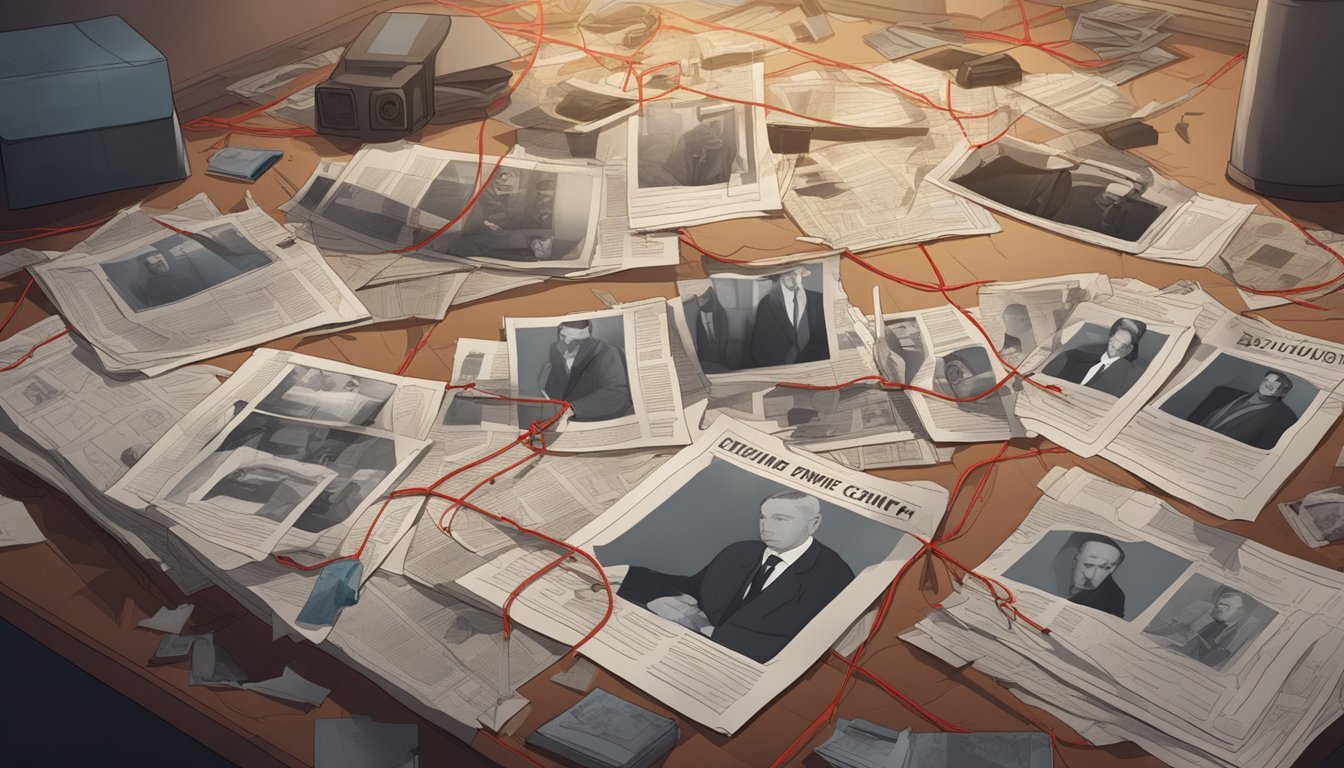Atlanta Monster: Reopening Cold Cases
How Media Sparks New Investigations
Atlanta Monster, a true crime podcast launched in 2018, delves into one of Atlanta's most haunting cold cases: the Atlanta Child Murders. From 1979 to 1981, at least 28 African American children and young adults were killed, leaving a community in fear and a city grappling with unsolved crimes. The podcast, hosted by Payne Lindsey, aims to shed new light on these decades-old cases.
Through interviews, archival footage, and expert analysis, Atlanta Monster has reignited public interest in the Atlanta Child Murders and prompted authorities to reexamine evidence. The series has garnered millions of downloads, demonstrating the power of podcasts to impact cold cases and capture public attention. Its success follows in the footsteps of Lindsey's previous podcast, Up and Vanished, which led to arrests in a long-dormant case.
The podcast format allows for in-depth exploration of complex cases, presenting multiple perspectives and theories. Atlanta Monster examines the investigation, the impact on the victims' families, and the broader societal context of the crimes. By revisiting these tragic events, the podcast serves as both a true crime narrative and a catalyst for seeking justice in unresolved cases.
Origins of the Atlanta Monster Case
The Atlanta Child Murders began in 1979, sparking fear and racial tensions in the city. Over two years, at least 28 African-American children, adolescents, and young adults were killed, leaving a community in terror and investigators scrambling for answers.
The Horrific Crimes of 1979
In July 1979, two bodies were discovered in southwest Atlanta, marking the start of a series of murders that would grip the city. Edward Hope Smith, 14, and Alfred Evans, 13, were the first victims in what became known as the Atlanta Child Murders. As the year progressed, more African-American children disappeared, their bodies later found in various locations around the city. The victims ranged in age from 7 to 28, with the majority being children and teenagers.
The killings continued into 1980 and 1981, creating a climate of fear and suspicion. Parents were afraid to let their children out of sight, and the African-American community felt particularly vulnerable.
Initial Investigations and Public Fear
Law enforcement initially struggled to connect the cases, treating them as separate incidents. As the body count rose, public pressure mounted for a coordinated response. The Atlanta Police Department formed a task force in late 1980 to investigate the murders.
The FBI became involved, providing additional resources and expertise. Despite these efforts, the killer remained elusive. Racial tensions escalated as some believed the murders were racially motivated hate crimes. Others suspected a serial killer was at work.
The community organized search parties and implemented buddy systems to protect children. Curfews were enforced, and the city was on high alert. The murders gained national attention, putting Atlanta under intense scrutiny.
The Rise of True Crime Media
True crime media has exploded in popularity, captivating audiences with real-life mysteries and criminal investigations. Podcasts and documentaries have emerged as powerful platforms for exploring unsolved cases and shedding new light on cold investigations.
Podcasts Leading Criminal Case Reexaminations
True crime podcasts have become a driving force in reopening cold cases. Shows like "Atlanta Monster" by Payne Lindsey and Tenderfoot TV have attracted millions of listeners, bringing renewed attention to decades-old mysteries.
These audio series often dive deep into case details, interviewing witnesses and experts to present fresh perspectives. The format allows for in-depth storytelling over multiple episodes, keeping audiences engaged.
Many podcasts partner with law enforcement, sharing tips and leads from listeners. This collaboration has led to breakthroughs in some investigations, demonstrating the impact of public interest in cold cases.
Documentaries and Storytelling
True crime documentaries offer a visual approach to exploring unsolved crimes. Filmmakers use archival footage, interviews, and reenactments to bring cases to life on screen.
These productions often benefit from larger budgets and production values than podcasts. This allows them to create compelling narratives that can reach wider audiences through streaming platforms and television networks.
Documentaries frequently focus on the human elements of cases, exploring the impact on victims' families and communities. This emotional storytelling can generate public empathy and pressure to reexamine cold cases.
Some documentaries have directly led to case reopenings or new evidence submissions. The visual format can be particularly effective in jogging memories or encouraging witnesses to come forward.
Profile of the Atlanta Child Murders
The Atlanta Child Murders terrorized the city from 1979 to 1981, claiming at least 28 young African American victims. This tragic series of killings devastated families and exposed racial tensions in the community.
Victims and the Community Impacted
The victims were primarily African American children, teenagers, and young adults, ranging from 7 to 28 years old. Most came from low-income neighborhoods in Atlanta. The murders created fear and anguish in the Black community, with parents afraid to let their children out of sight.
The killings highlighted racial disparities in law enforcement response. Many felt the cases weren't initially taken seriously due to the victims' race and socioeconomic status. Community groups formed to search for missing children and demand action from authorities.
The murders left deep scars on Atlanta's African American community. Families struggled with grief and unanswered questions for decades. The case brought national attention to issues of racism and poverty in the city.
Suspects and Wayne Williams
Wayne Williams emerged as the primary suspect in 1981. Police arrested him after hearing a splash in a river where bodies had been dumped. Fibers from Williams' home and car matched evidence from some victims.
Williams was convicted of killing two adult victims in 1982. Prosecutors linked him to several child murders, but he was never tried for those cases. Williams maintains his innocence to this day.
Some investigators believe multiple killers were responsible. Alternative suspects proposed over the years include KKK members and a Atlanta-based pedophile ring. The case remains controversial, with debate over Williams' guilt and whether all the murders were connected.
Innovations in Case Reopening
New technologies and investigative methods have revolutionized how cold cases are approached. These advancements offer fresh opportunities to uncover evidence and bring closure to long-unsolved crimes.
Role of New Technologies in Cold Cases
DNA analysis has become a game-changer in reexamining cold cases. Advanced genetic testing can now extract usable DNA from smaller, degraded samples. This allows investigators to revisit evidence from decades-old crime scenes with new eyes.
Forensic databases have expanded dramatically, increasing the chances of finding matches. Genealogy websites have also proven valuable, helping identify suspects through family DNA connections.
Digital forensics tools can recover data from old devices, potentially revealing crucial information. 3D crime scene reconstruction software allows detectives to visualize and analyze past events in new ways.
Investigative Podcasts and Fresh Leads
True crime podcasts like "Atlanta Monster" have emerged as powerful tools for reopening cold cases. These series often reach large audiences, generating new tips and leads for investigators.
Podcasts can shed light on overlooked details and bring renewed attention to forgotten cases. They often feature interviews with witnesses, family members, and experts, providing fresh perspectives.
Some podcasts actively investigate cases, conducting interviews and analyzing evidence. This citizen journalism can uncover new information that aids official investigations.
The public engagement sparked by these podcasts can pressure law enforcement to reexamine cold cases. In some instances, podcast investigations have directly led to case reopenings or even arrests.
Legal and Societal Implications
The Atlanta Monster case exposed significant issues in law enforcement practices and the criminal justice system, particularly regarding civil rights and public trust. These concerns continue to shape discussions around cold cases and investigative methods today.
Law Enforcement Practices and Public Trust
Police handling of the Atlanta child murders faced intense scrutiny. The case highlighted racial disparities in how missing persons reports were treated. Many families of victims felt their concerns were initially dismissed or not taken seriously enough.
The investigation's focus on Wayne Williams as the sole suspect raised questions about tunnel vision in police work. Critics argued that other potential leads were overlooked or not pursued thoroughly enough.
Public trust in law enforcement eroded as the case dragged on without clear resolutions. This distrust lingered long after the official closing of the case, contributing to ongoing community tensions.
The Criminal Justice System and Civil Rights
The Atlanta Monster case intersected with broader civil rights issues of the era. It exposed systemic inequalities in how crimes against African American victims were investigated and prosecuted.
The trial of Wayne Williams became a flashpoint for debates about fair representation and racial bias in the justice system. Some argued that media coverage and public pressure influenced the legal proceedings unfairly.
Civil rights activists used the case to push for reforms in police practices and greater accountability in the criminal justice system. These efforts led to changes in how missing persons cases are handled, especially those involving minority victims.
The reopening of cold cases through podcasts and documentaries has reignited discussions about unresolved issues in the original investigation and trial. This renewed attention has prompted re-examinations of evidence and investigative techniques used decades ago.
Impact on Cultural Discourse
Atlanta Monster brought renewed attention to a dark chapter in Atlanta's history. The podcast sparked conversations about racial injustice, media portrayal of crime, and lingering community trauma.
Media Influence on Public Perception
True crime podcasts like Atlanta Monster shape how people view past events. The series reignited interest in the Atlanta child murders, prompting many to reexamine the case. It highlighted how media coverage at the time may have influenced public opinion and the investigation.
The podcast's storytelling exposed new generations to this painful history. It shed light on how fear gripped Atlanta's Black community during the killings. Through interviews and archival footage, listeners gained insight into the victims' lives and families' struggles for justice.
Atlanta Monster's popularity demonstrated the power of podcasts to reach wide audiences. It showed how digital media can amplify forgotten stories and cold cases.
True Crime as a Lens on Society
The Atlanta child murders reflect deeper societal issues beyond the crimes themselves. Atlanta Monster used this case to explore themes of racial tension, poverty, and distrust between communities and law enforcement.
The podcast examined how these factors may have impacted the investigation and public response. It raised questions about whose stories get told and why certain victims receive less attention.
By revisiting this painful history, Atlanta Monster prompted reflection on lingering inequities. It sparked discussions about unresolved trauma in Atlanta's Black community. The series showed how true crime can be a vehicle for social commentary and historical analysis.
Atlanta Monster: The Serial's Legacy
Atlanta Monster reexamined the Atlanta Child Murders, shining new light on a dark chapter in the city's history. The podcast sparked renewed interest in the case and its lasting impact on victims' families and the community.
Consequences for Surviving Victims and Families
The podcast gave voice to those affected by the murders. Families of victims shared their ongoing pain and frustration with the lack of closure. Many expressed doubts about the conviction of Wayne Williams and felt justice remained elusive.
The series highlighted how the murders disproportionately impacted vulnerable, impoverished communities. It exposed systemic issues that left children unprotected 40 years ago.
Survivors spoke about the lasting trauma and fear that shaped their lives. The podcast created a platform for their stories to be heard after decades of silence.
Ongoing Search for Truth and Justice 40 Years On
Atlanta Monster reignited interest in solving lingering questions about the case. It prompted officials to reexamine evidence using modern forensic techniques.
In 2019, Atlanta Mayor Keisha Lance Bottoms reopened the investigation into the murders. This decision came after increased public pressure following the podcast.
The series explored theories about other potential suspects and questioned the thoroughness of the original investigation. It highlighted the challenges of finding justice for cold cases decades later.
Debate continues about Wayne Williams' guilt and whether all the murders can be attributed to a single killer. The podcast emphasized the complexity of the case and the ongoing search for truth.
Expanding the Narrative
The Atlanta Monster podcast inspired a wave of true crime investigations across media platforms. Its success led to explorations of other cold cases and broader examinations of systemic issues in criminal justice.
Relating to Modern Cases and Podcast Narratives
Up and Vanished, created by filmmaker Payne Lindsey, set the stage for Atlanta Monster's approach. The podcast's first season focused on Tara Grinstead, a high school teacher and beauty queen who vanished from her Georgia home in 2005.
This format of revisiting cold cases through podcasts gained popularity. Season 2 of Up and Vanished explored a different missing persons case, demonstrating the adaptability of the podcast medium for true crime storytelling.
Other podcasts like The Girlfriends and Our Lost Sister emerged, each tackling unsolved mysteries with a similar investigative approach.
Beyond Atlanta: National and Global Perspectives
Atlanta Monster's success sparked interest in examining cold cases across the United States and internationally. Podcasts and documentaries began exploring unsolved crimes in various locations, from small towns to major cities.
These productions often highlighted systemic issues in law enforcement and criminal justice systems. They examined racial disparities, flawed investigative techniques, and the impact of media coverage on high-profile cases.
Some creators adapted their podcast investigations into other media formats. Books, television series, and even novels drew inspiration from these real-life cold cases, further expanding their reach and impact.







